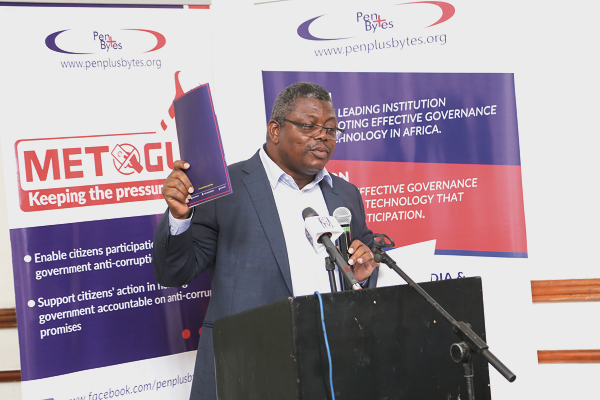
Many Ghanaians score govt low at fighting corruption — Report
Majority of Ghanaians who responded to a research on corruption are not satisfied with the government’s efforts at fighting the canker.
They were also of the view that the government was displaying a lukewarm attitude in adopting a multi-pronged approach to tackle the menace of corruption.
These were part of the research findings contained in the first METOGU Anti-corruption Report launched in Accra yesterday.
METOGU is a Guan word which means: “Keeping the pressure on.”
The research was conducted by Penplusbyte and was aimed at providing a platform that would encourage citizens to put pressure on public officials to work hard towards a zero corruption situation in the country.
Method of research
Touching on the method of research, a Consultant to Penplusbyte, Dr George-Grandy Hallow, remarked that the survey collected information from four regions in Ghana, namely Greater Accra, Western, Ashanti and Volta.
He stated that 792 respondents were selected for the study and the research adopted a combination of survey and focus group discussion (FGD) as its method.
A Lead Researcher for the project, Dr Foster Frempong, stated that 95.8 per cent of the respondents affirmed that corruption was high in Ghana, with 89.2 per cent confirming the position that most Ghanaians paid facilitation and illegal fees before accessing public service.
He said 56 per cent also believed that the creation of the Office of the Special Prosecutor (OSP) would curb corruption, while 56 per cent believed competitive bidding was the only way to ensure value for money in public procurement.
Study objective
The study sought to identify the public’s understanding of general corruption issues, the impact of the creation of the OSP, the passage of the Right to Information (RTI) Bill, reforms in the Public Procurement Act and value for money.
Also, the passage of the Public Officers’ Code of Conduct Bill, the assets declaration regime, as well as the National Health Insurance Scheme and the school feeding programme were some other themes focused on.
The essence of the research was to empower the public to push the government to fulfil its manifesto promises.
The research was, thus, based on the New Patriotic Party (NPP) manifesto, showing its achievements, failure and progress.
Recommendation
Dr Frempong recommended that the OSP and other relevant anti-corruption institutions must be resourced so that they could carry out their mandate in the fight against corruption.
He added that in the basic and secondary school curriculum of Social Studies, a topic on anti-corruption should be taught to help build patriotism in children.
“Chapter 24 of the 1992 Constitution should be amended to give way to an asset declaration regime where verifiability by the Auditor General and the public will be easy and constant monitoring will be done,” he noted.
Launch
Launching the report, the Deputy Commissioner of the Commission on Human Rights and Administrative Justice (CHRAJ), Mr Richard Quayson, explained that although state anti-corruption agencies and accountability institutions were working hard in the fight against corruption, much had not been achieved.
Unfortunately, he said, the country was noted for making promises, with little or no serious commitment to carry them out.
He urged the public to serve as timely reminders to leaders to ensure that their plans were executed.
